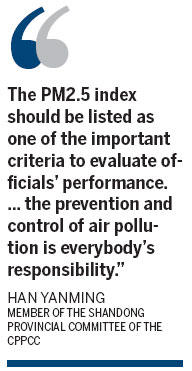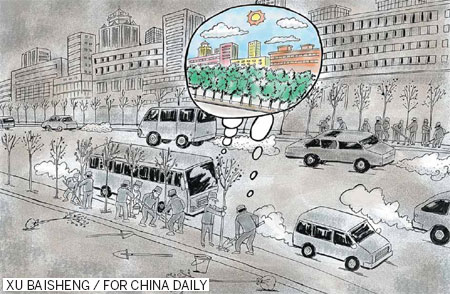 Large Medium Small
Large Medium Small
Debates triggered by worst air pollution in nation's history, report Sun Li in Xiamen, Zhao Ruixue in Jinan, Zhang Xiaomin in Dalian and He Na in Beijing.
Few public issues have generated so much discussion, unease, hatred and a general feeling of helplessness as the gray blanket of smog that descended across China last year as the country experienced the worst air pollution in its history.
Data from the China Meteorological Administration show that during December almost half the country, including 25 provinces and regions and more than 100 first- and second-tier cities, was shrouded in dense smog.
However, the four worst incidents came in January last year when most of central and eastern China was affected and visibility was reduced to less than 100 meters in the worst-hit areas.
When the meteorological administration recently reported its top 10 major climate events of 2013, the four incidents were lumped together and ranked the most important weather incident of the year.
The Chinese word for smog is mai, a complicated character that involves 22 separate pen or brush strokes and is difficult to pronounce, let alone write.
However, since smog became big news in China, mai has cropped up with increasing regularity in conversations, in TV and radio reports, on social media and the Internet, giving this almost-obsolete word a new lease on life.
Just as some foreigners are said to open every conversation with a comment about the weather, an increasing number of Chinese seem to have adopted the habit. A glance at the sky and a muttered mai has almost replaced the traditional greeting of Ni chi le, ma? meaning, "Have you eaten?"
One result of this raised awareness is that smog has become the hottest topic on the agendas of the ongoing provincial and city "two sessions" meetings, the most important annual event in China's political calendar at both the local and central level, centered around lawmakers meeting at provincial People's Congresses and political advisers gathering at sessions of the Chinese People's Political Consultative Conference.
Special meeting
Hebei province is one of the regions most severely affected by air pollution. In a bid to improve the air quality, the authorities added a new session - a special meeting to discuss and approve the Report on the Prevention and Control of Air Pollution produced by the provincial authorities.
Aiming to lower the concentration of airborne PM2.5 - particulate matter with a diameter of 2.5 micrometers or less - by 4 percent, the report proposed strict controls on emissions from businesses in the steel, coal and metallurgical sectors, and on vehicles. In addition, the province will also improve controls on emissions from pharmaceutical businesses and medical institutes. It will also establish an air pollution control network and prevention system with input from the general public. Finally, the province will draw up a series of compensatory awards to be paid by the worst polluters.
During its recent two sessions, Lanzhou, the capital of Gansu province and another of the cities badly affected by smog in recent years, suggested the strictest control measures in China. The measures included the adoption of an administrative accountability system for air pollution, the establishment of an environmental protection bureau attached to the local police authorities and the use of online environmental tests.
It's hardly surprising that some of the places most affected by smog, such as Beijing, Tianjin, and the provinces of Hebei, Shanxi, Gansu and Henan, have introduced some of the strictest measures to tackle the problem, but even areas with a national, or even international, reputation for good weather and clear air placed smog at the top of the agenda during their two sessions.
They had good reason to do so; even China's cleanest city - Sanya, on the island province of Hainan - was unable to escape the gray blanket and was wreathed in smog from Oct 20 to 26. The problem also affected Lhasa, the capital of the Tibet autonomous region, which stands at an average altitude of more than 3,600 meters, in December, causing flights to be suspended.
Protective masks
Ye Zhiyong, an outdoor sports enthusiast from Xiamen, Fujian province, had used the phrase "Let's jog under the warm sun" as a sign-off on QQ, a highly popular instant-messaging service, for years. However, on a December day when the city was stifled by smog so thick that the sun was dimmed, the 27-year-old salesman replaced his optimistic message with just two words, "Damn it".
"I never imagined that Xiamen, a city known for its excellent air quality, would be affected by smog," said Ye, adding that the hazardous environment dampened his enthusiasm for outdoor activities and forced him to buy a protective mask, something he had never considered necessary before.
Fujian was first badly affected by smog in December. A report released by the provincial Environmental Protection Bureau shows that from Dec 28 to Jan 6, only two days were considered "good" in terms of air quality in Fuzhou, while Xiamen recorded six "lightly polluted" days in early January.
Smog used to be rare in Fujian and the purity of its air has always been a proud boast of the coastal province. Many residents regarded the province as a defensive bunker that would shield them from heavy smog. Now, however, they are worried that the bunker has been infiltrated and smog became a hot topic at the province's two sessions.
Pan Liang, a member of the Fujian Committee of CPPCC and an official with the Fujian Committee of the Chinese Peasants' and Workers' Democratic Party, suggested the meteorological and environmental protection agencies should beef up research and ascertain the cause of the filthy air.
"Some meteorological experts explained that the smog was blown from the north to the south, but did it really come that far? Do some of our cities produce the smog themselves, through car emissions and other means," Pan asked. "Only when we know the real reasons will we be able to tackle the issue properly," he said.
Fearing that many local residents feel "immune" to the problem, Pan also urged greater dissemination of information to the public, such as the constituent factors of smog, an early warning system of days when the levels are likely to be high, and the advisability of wearing protective masks.

Chen Xiaowen, an entrepreneur from Xiamen and a deputy at the Fujian Provincial People's Congress, suggested establishing a system to monitor the level of air pollution and provide early warnings.
Chen, who often jogs around Xiamen's ring road, said she has sometimes noticed a strange, yellow hue in the sky above neighboring Zhangzhou. "I know there's a large power station down there, but did it cause the pollution? We don't know because Xiamen's environmental protection bureau is unable to monitor the pollution, only the Zhangzhou bureau can do that," she said. "The fight against smog can never just be the work of one city, though, and combined supervision by several cities should come into force."
Firecracker ban?
Smog was also the main topic of conversation at the two sessions in the coastal city of Dalian in Liaoning province and also in Weihai, Yantai and Rizhao on the coast of nearby Shandong province.
Located at the southernmost tip of the Liaodong Peninsula, Dalian is bordered by the sea on three sides, and 41.5 percent of the city is covered by forests. Despite attracting nationwide fame for its beauty and clean air, Dalian has also been plagued by heavy smog.
At the annual session of the municipal people's congress, which ran from Jan 7 to 10, the deputies expressed deep concern. Zhou Hong, general manager of a local cleaning company, suggested banning firecrackers in the main urban areas during Spring Festival, which falls at the end of the month.
"Heavy smog has a great impact on industrial production, traffic and people's health. If we had to choose between firecrackers and clean air, I believe most residents would choose the latter," she said.
In the local government's work report, Dalian Mayor Li Wancai said the city will strengthen environmental construction and protection this year; 120 million trees will be planted and coal-fired power plants will be equipped with desulphurization equipment and facilities to clean the air.
Official reckoning
On Friday, the opening day of the Shandong Provincial People's Congress, the entire province spluttered under a cloud of heavy smog. Even in Weihai, which had the best air quality among 17 cities in the province, the PM2.5 index exceeded 200 micrograms per cubic meter, far higher than the World Health Organization's safe limit of 30.
In the local government report, Guo Shuqing, Shandong's governor, stressed that Shandong will spare no effort to combat air pollution and the province must control energy consumption and gradually reduce the amount of coal it consumes.
In addition to limits on emissions from vehicle exhausts and pleas to drivers to reduce car use, Han Yanming, a member of the Shandong Provincial Committee of the CPPCC, suggested that the city of Yantai should fully utilize its abundant renewable resources, such as wind, nuclear and solar power, and that the local authorities should be judged by their response to the problem.
"The PM2.5 index should be listed as one of the important criteria to evaluate officials' performances," he said. "I thought the smog was much heavier last year than ever before. It causes obvious damage to health, and so the prevention and control of air pollution is everybody's responsibility."
Contact the writers at sunli@chinadaily.com.cn, zhaoruixue@chinadaily.com.cn and hena@chinadaily.com.cn

(China Daily 01/22/2014 page6)